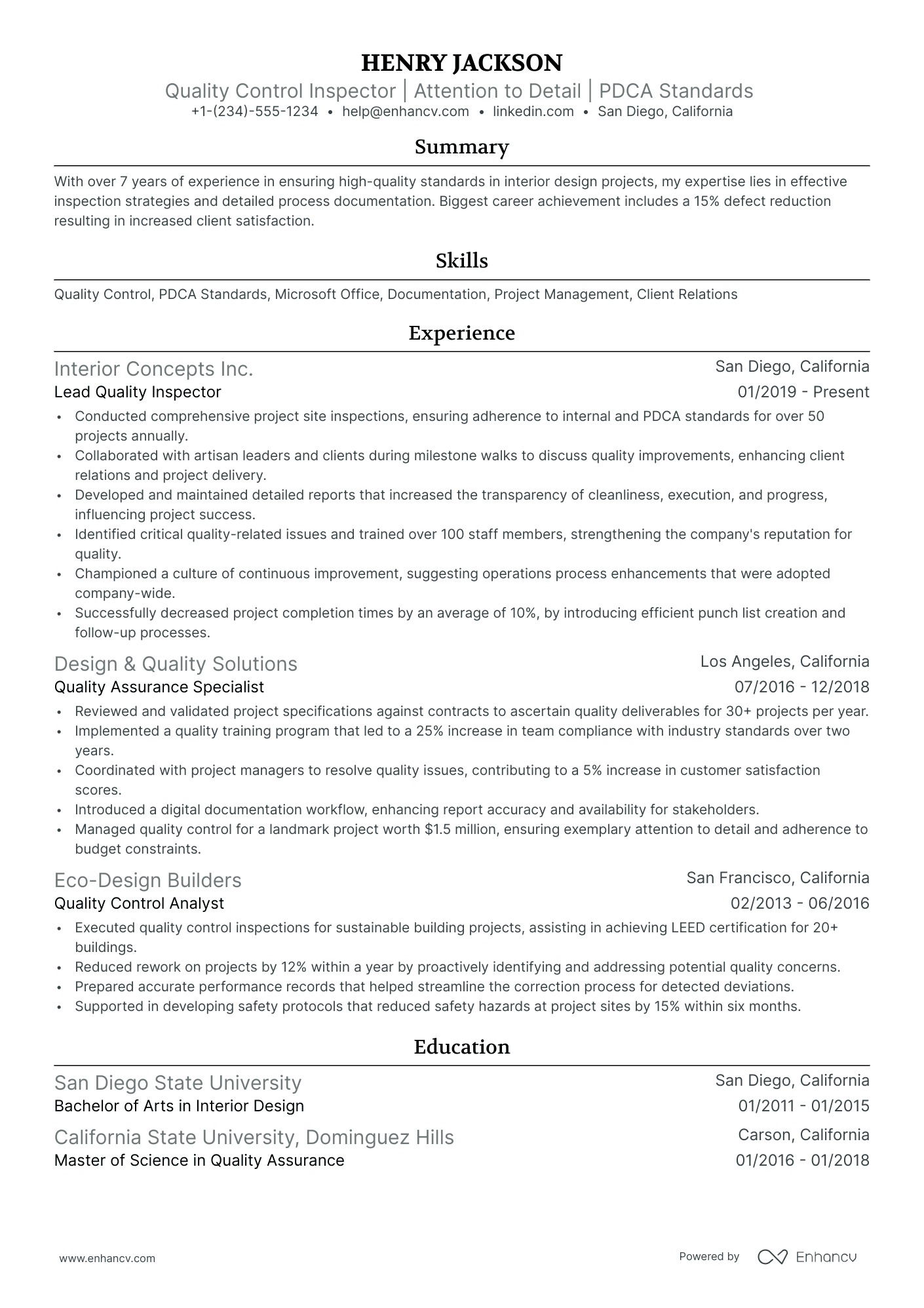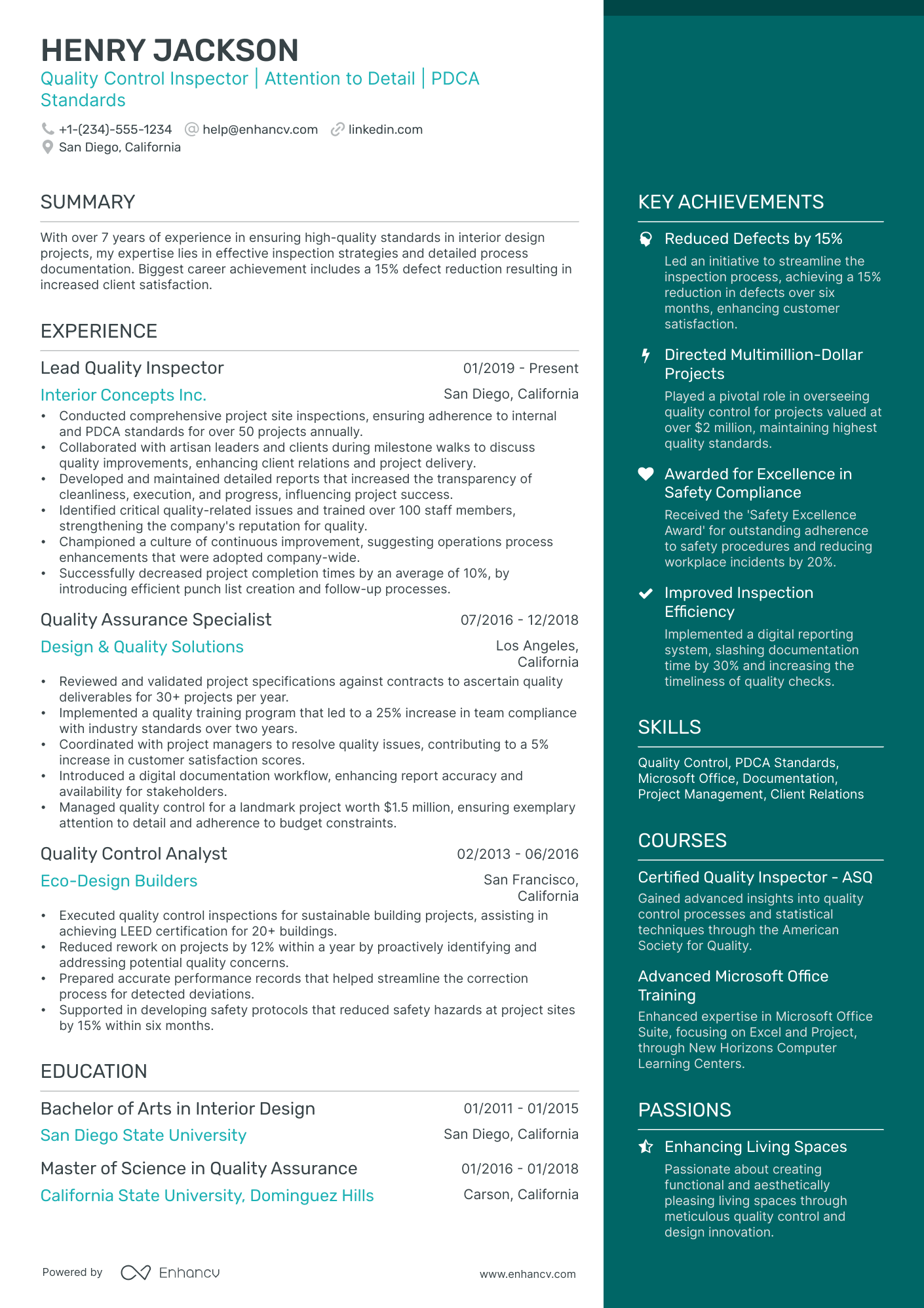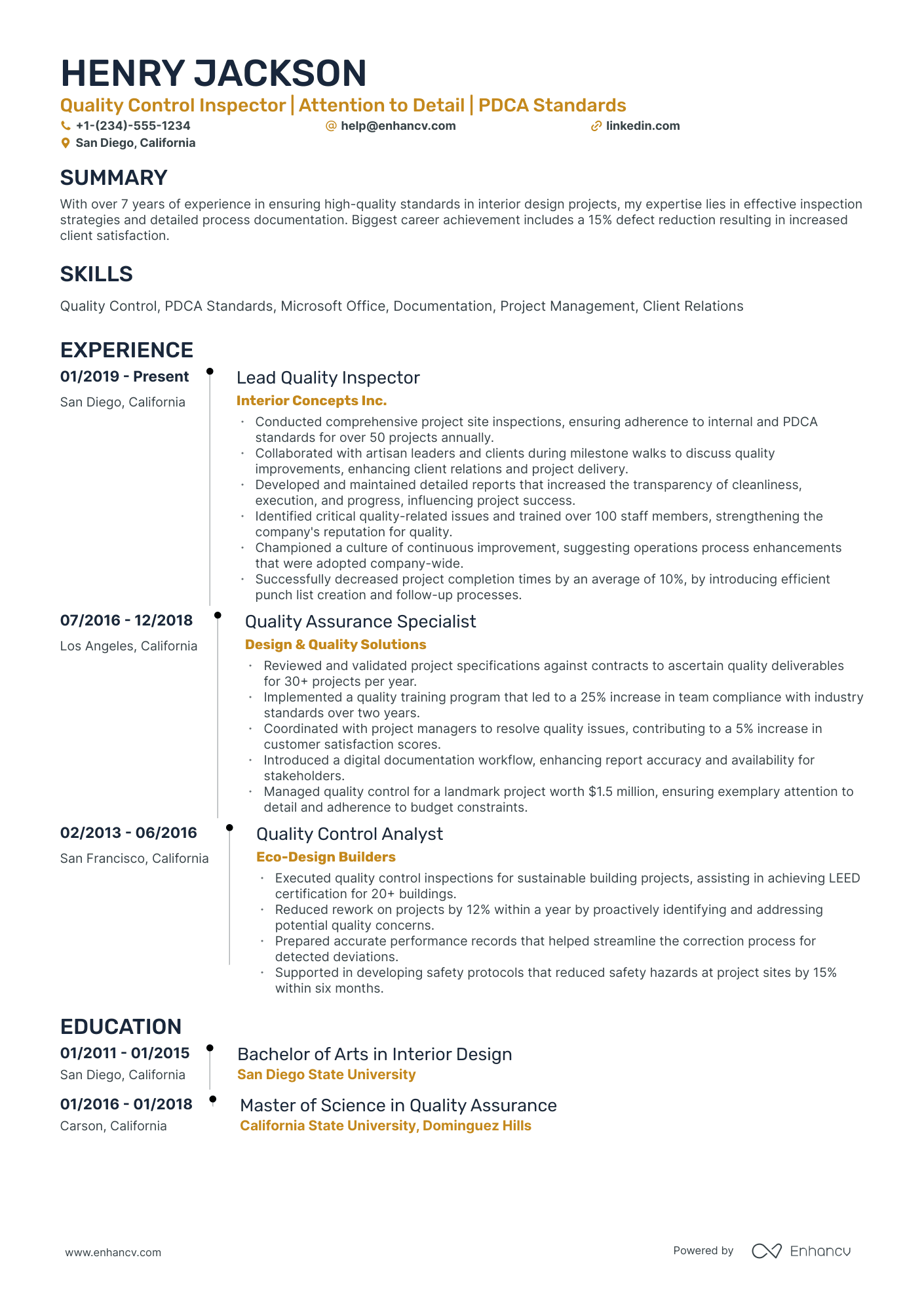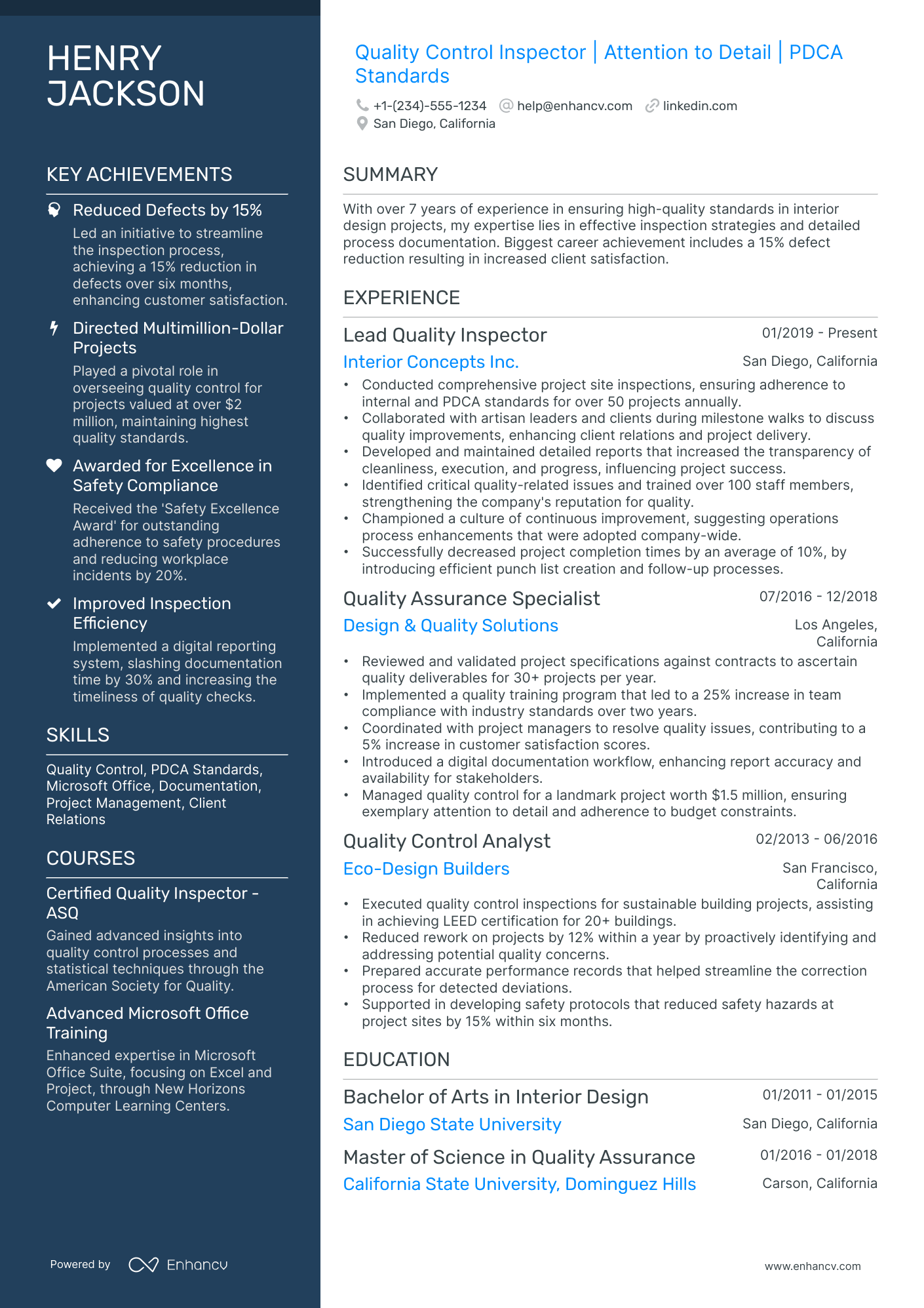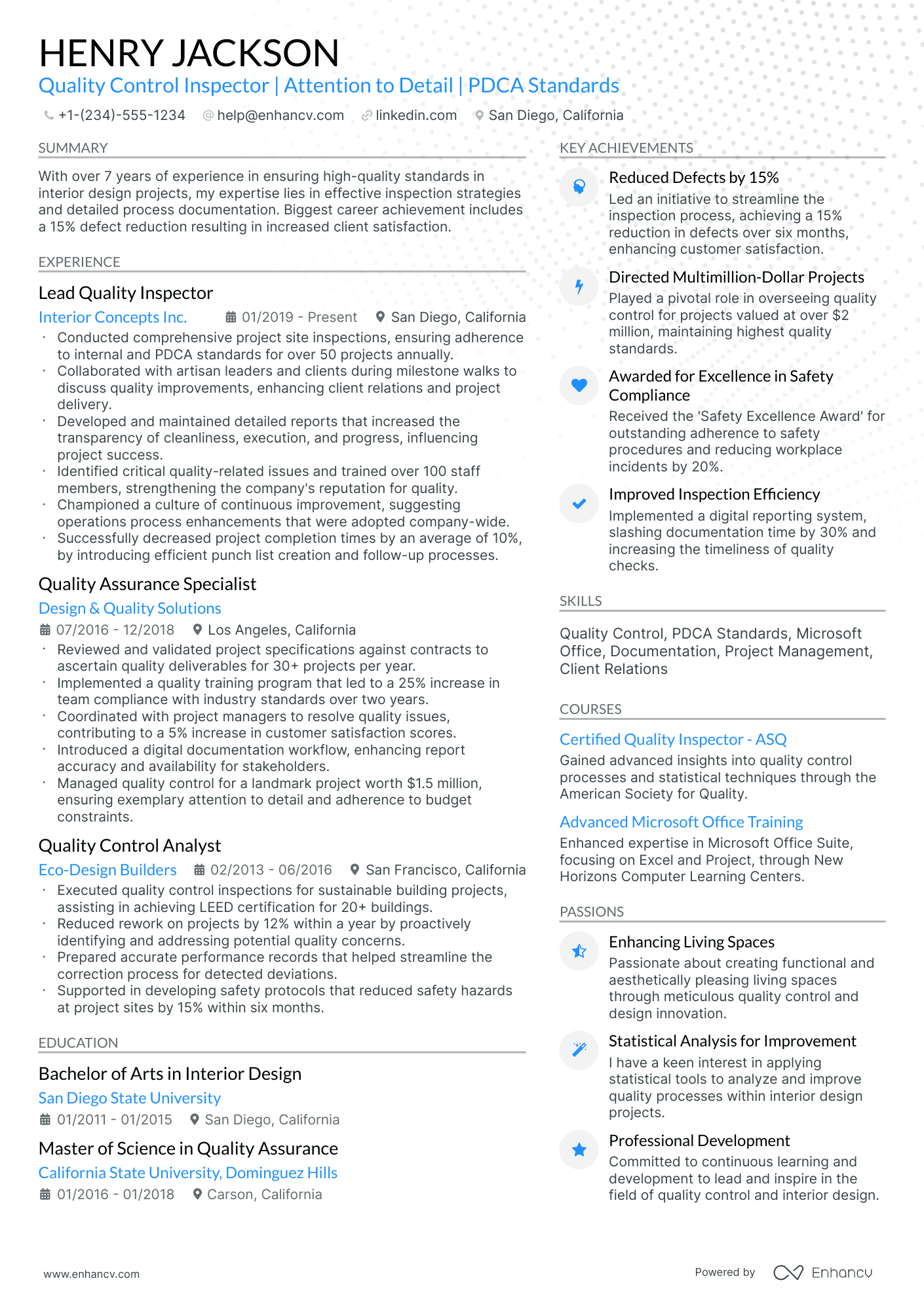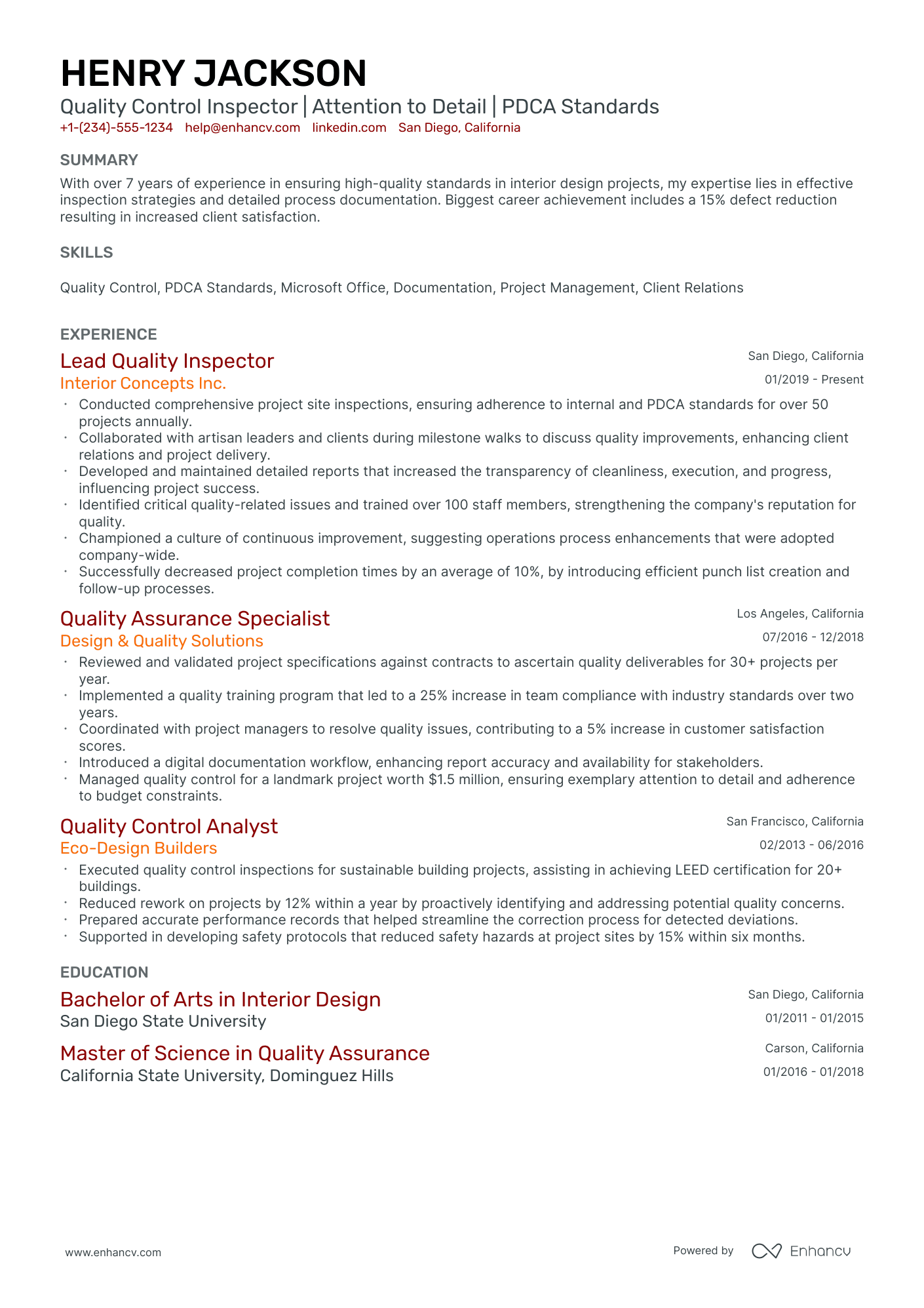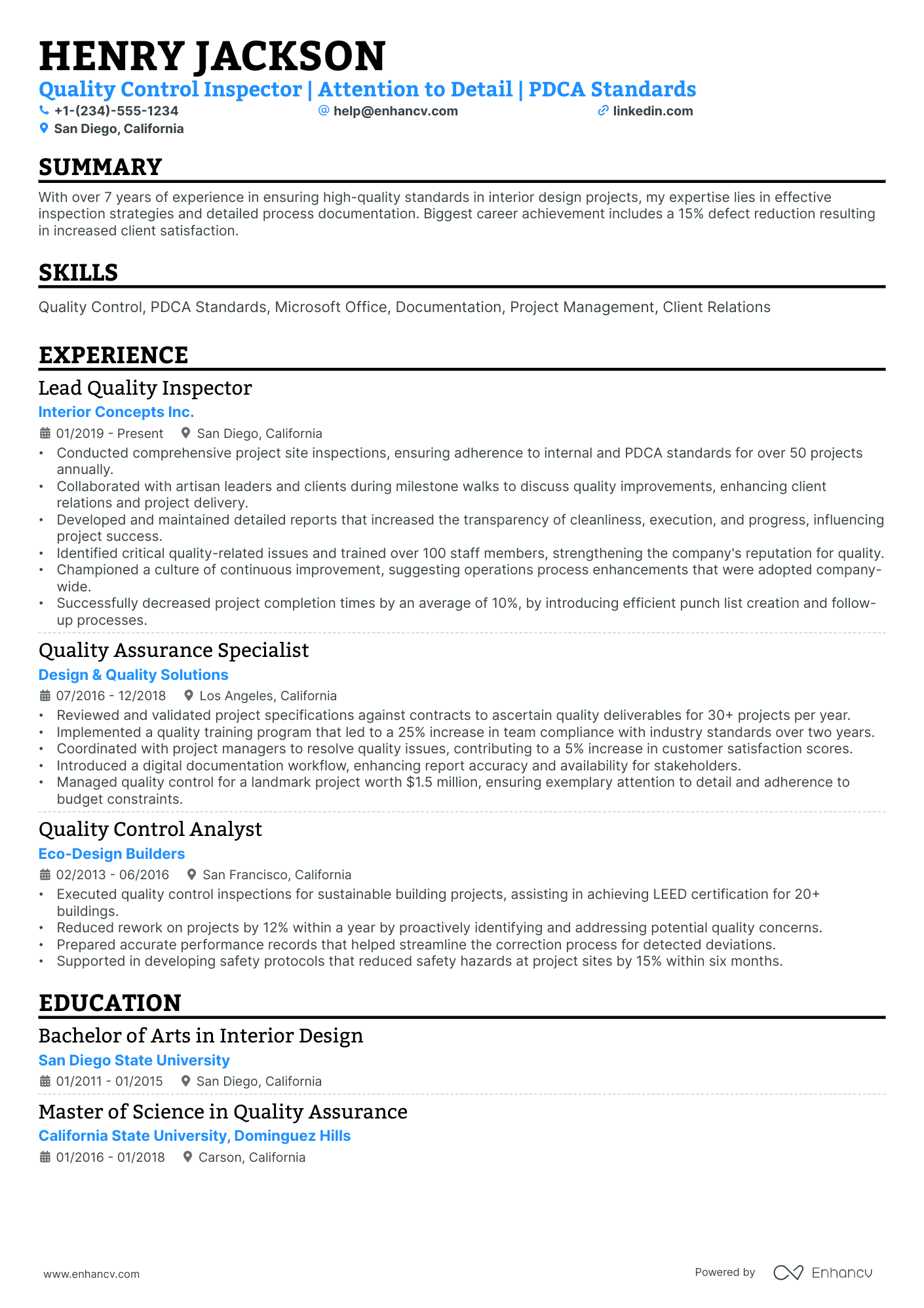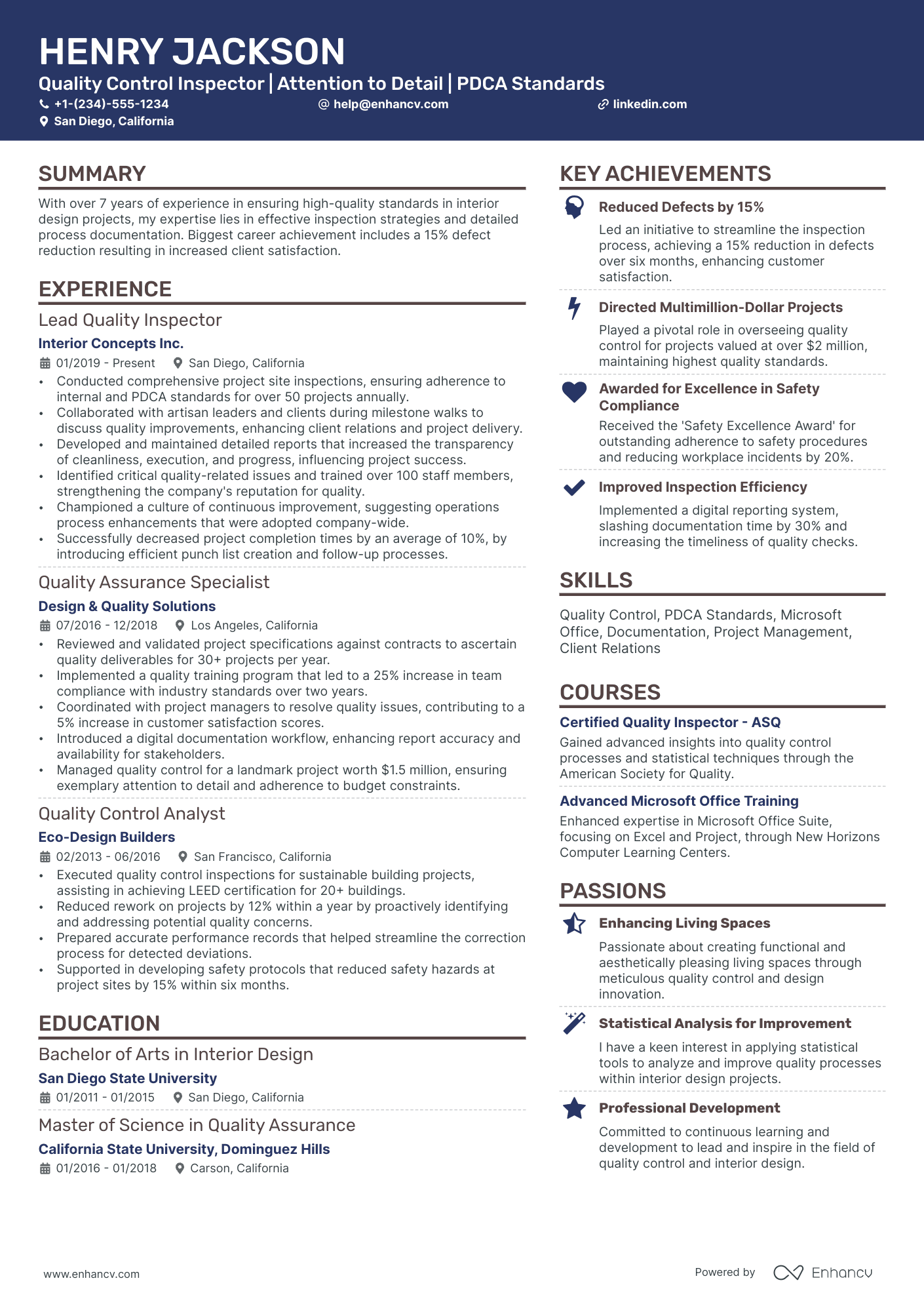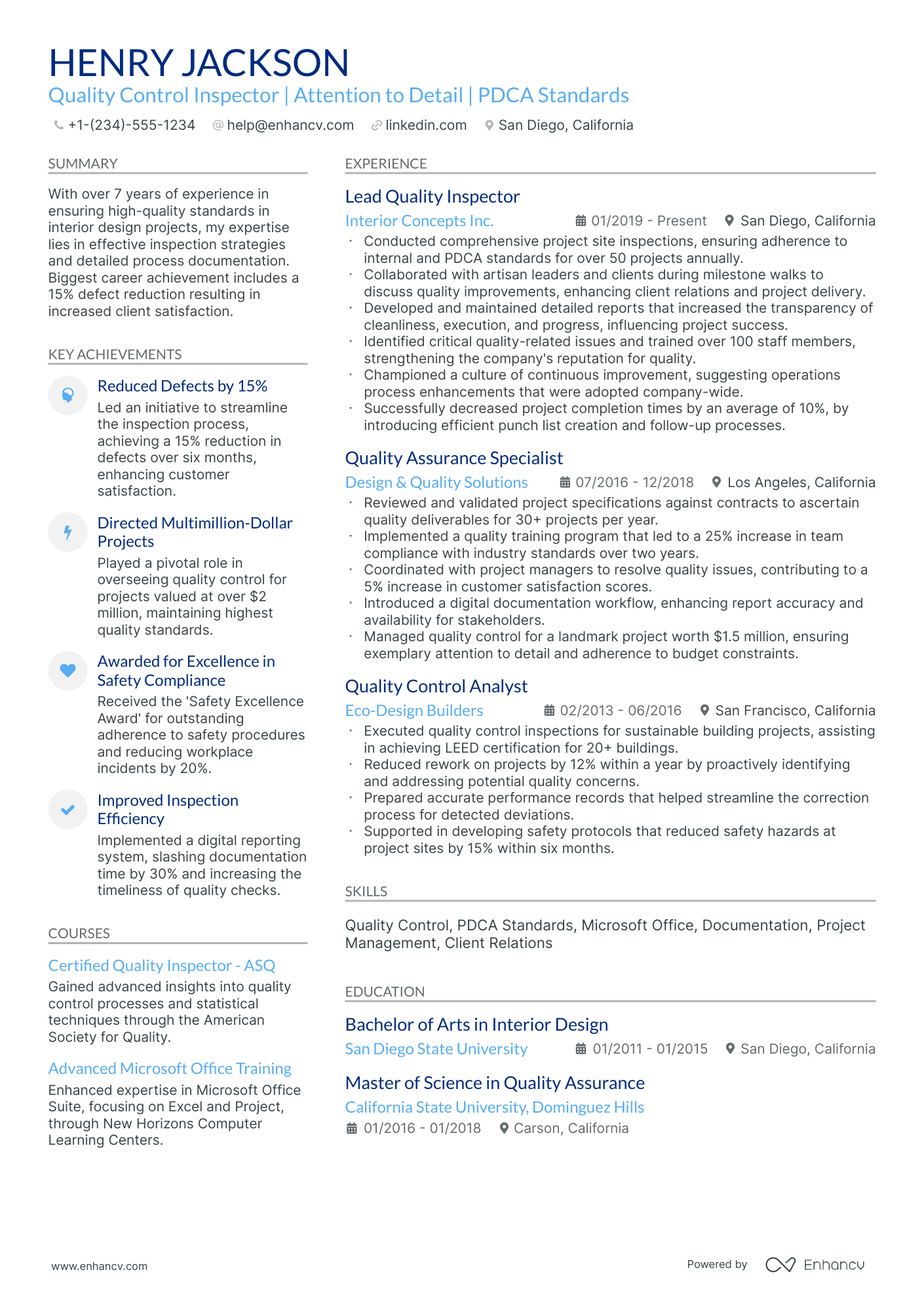One resume challenge you may encounter as a quality control inspector is effectively conveying your attention to detail and ability to identify and address non-conformance issues. Our guide provides tailored advice on showcasing your meticulous inspection skills and problem-solving strategies, ensuring your resume stands out to potential employers.
- The most straightforward and effective resume format, ensuring your quality control inspector resume stands out among numerous candidate profiles;
- The significance of the top one-third of your resume, including the header, summary or objective, and skills section, and its impact on recruiters;
- Frameworks and structures used by real quality control inspector professionals, offering insights on how to enhance your resume with industry-specific expertise;
- A variety of quality control inspector resume sections that bolster your profile, showcasing your comprehensive capabilities and distinctiveness.
Gaining insights from the best has never been easier. Explore more quality control inspector resume examples below:
- Quality Assurance Specialist Resume Example
- Quality Control Technician Resume Example
- Quality Assurance Manager Resume Example
- Quality Manager Resume Example
- QA Manager Resume Example
- Quality Specialist Resume Example
- Quality Assurance Auditor Resume Example
- Test Manager Resume Example
- Quality Control Engineer Resume Example
- Quality Assurance Supervisor Resume Example
The ultimate formula for your quality control inspector resume format
Our best advice on how to style your quality control inspector resume is this - first, take the time to study the job advert requirements.
The resume format you select should ultimately help you better align how your experience matches the specific role.
There are four crucial elements you need to thus take into consideration:
- How you present your experience. If you happen to have plenty of relevant expertise, select the reverse-chronological resume format to organize your experience by dates, starting with the latest.
- Don't go over the top with writing your resume. Instead, stick with a maximum of two-page format to feature what matters most about your profile.
- Headers aren't just for "decoration". The header of your resume helps recruiters allocate your contact details, portfolio, and so much more.
- The PDF format rules. It's the most common practice to submit your quality control inspector resume as a PDF so that your resume doesn't lose its layout. However, make sure the read the job well - in some instances, they might require a doc file.
Think about the location of your application – Canadian resumes, for instance, might follow a different structure.
Upload & Check Your Resume
Drop your resume here or choose a file. PDF & DOCX only. Max 2MB file size.
PRO TIP
If you're in the process of obtaining your certificate or degree, list the expected date you're supposed to graduate or be certified.
The key to your quality control inspector job-winning resume - present your expertise with these sections:
- A header to make your resume more scannable
- Snapshot of who you are as a professional with your resume soft skills, achievements, and summary or objective
- Job advert keywords in the skills section of your resume
- Resume experience quantifying your past job successes with metrics
- A relevant education, certification, and technical sills section to provide background to your technological/software capabilities
What recruiters want to see on your resume:
- Demonstrated knowledge of industry-specific quality standards and regulations.
- Proficiency with quality inspection tools and techniques, including statistical process control (SPC).
- Experience in conducting root cause analysis and implementing corrective and preventive actions.
- Detail-oriented with strong analytical and problem-solving skills.
- Ability to read and interpret technical documentation and blueprints.
The quality control inspector resume experience section: a roadmap to your expertise
The resume experience section provides you with an opportunity to tell your professional narrative.
Recruiters, reading between the lines of your resume, use the experience section to better understand your unique skill set, accomplishments, and what unique value you bring about.
Discover five quick steps on how to write your experience section:
- Curate only relevant experience items to the role and include the company, description, and dates; all followed by up to six bullets per experience item;
- Each experience item should feature tangible results of your actions - if you can include a number or percent, this will further highlight your aptitude;
- If you've received any managerial or customer feedback, use short excerpts of it as further social proof of your technical or people skills;
- Make sure you're using the appropriate verb tense when listing your responsibilities;
- Within the description for each role, you could summarize your most noteworthy and relevant achievements.
Now, take note of how a real-world quality control inspector professional received opportunities at industry leaders with these resume experience sections:
- Initiated and led a comprehensive review of the manufacturing process, identifying key areas for enhancement which increased product consistency by 27%.
- Implemented a state-of-the-art digital reporting system that improved record-keeping accuracy and reduced inspection time by 35%.
- Trained and supervised a team of 5 junior inspectors, fostering a culture of continuous improvement and compliance with industry regulations.
- Orchestrated a plant-wide audit, uncovering potential risks, and managing mitigation strategies that enhanced safety standards by 15%.
- Established stringent quality benchmarks for raw material intake, dramatically reducing production downtime due to material deficiencies.
- Collaborated with R&D to refine product design, resulting in a 22% increase in customer satisfaction as per annual survey feedback.
- Analyzed and interpreted blueprints, data, manuals, and other materials to determine specifications, inspection and testing procedures.
- Coordinated with supply chain partners to ensure compliance with quality standards, reducing supplier defect rate by 19%.
- Performed statistical analysis on production defects, which contributed to a 12% increase in overall product quality.
- Inspected over 100+ components daily, ensuring all aerospace products met stringent quality criteria before final assembly.
- Conducted root cause analysis on defect trends and provided actionable feedback to the production team, reducing repeat defects by 25%.
- Piloted a cross-departmental initiative to streamline inspection protocols, shortening the inspection cycle by 20% without compromising on quality standards.
- Managed the inspection of complex electronics for defense systems, ensuring 100% compliance with military-grade specifications.
- Developed a quality metrics dashboard that provided real-time feedback on production issues, driving a 14% increase in operational efficiency.
- Championed a zero-defect program that resulted in a 30% reduction in customer complaints over a two-year period.
- Calibrated and maintained sophisticated testing equipment, which was crucial in maintaining a 99.8% product accuracy rate for medical devices.
- Executed detailed product inspections and provided comprehensive reports that guided the decisions of the product development team.
- Assisted in designing and implementing an improved workflow for the QC department, elevating productivity by 18%.
- Carried out detailed inspections of automotive components ensuring adherence to ISO standards and reducing rework by 12%.
- Collaborated closely with engineering teams to develop corrective action plans for products failing to meet quality benchmarks.
- Authored comprehensive quality control protocols that became the standard for future projects, enhancing process quality assurance.
- Implemented a real-time tracking system for batch quality control, markedly improving response times to quality deviations by 50%.
- Played a pivotal role in achieving the plant’s first ISO 9001 certification, leading to a 20% increase in order fulfillment accuracy.
- A key team member in the research and validation of new inspection technologies, streamlining the quality control process.
- Led a department responsible for the inspection of over 200,000 units per year, maintaining below a 1% defect rate for consumer electronics.
- Implemented lean manufacturing principles in inspection processes, cutting waste by 10% and improving inspection cycle time by 15%.
- Developed and delivered training programs for new inspectors, raising the team's efficiency and accuracy by 20%.
- Designed and executed a comprehensive inspection program that reduced process bottlenecks and accelerated time-to-market by 10%.
- Directed the quality control operations within a high-volume manufacturing environment, ensuring product integrity and regulatory compliance.
- Engaged with customers to gather product feedback and incorporated the insights back into the quality assurance process, improving product fit by 15%.
Quantifying impact on your resume
- Include the number of production lines you were responsible for inspecting to demonstrate your capability to handle scale.
- Specify the percentage of quality improvement initiatives you led that resulted in a reduction in defective products, showcasing efficiency enhancements.
- Detail the exact number of quality assessments performed to underline your thoroughness and experience with inspection routines.
- Mention the number of quality control team members you've trained or supervised to emphasize your leadership and mentoring skills.
- Cite any decrease in return or complaint rates quantitatively to illustrate your direct impact on product reliability and customer satisfaction.
- Highlight the frequency of your audit cycles to show your commitment to maintaining consistent quality standards.
- List any certifications or courses completed with the total hours of training to underline your dedication to professional development.
- Report the cost savings achieved from waste reduction or process improvements to demonstrate your contribution to the company's profit margin.
Action verbs for your quality control inspector resume
Quality control inspector resume without experience: a walk-through guide
If you don't happen to have any relevant experience yet, you can substitute this with:
- Short-term gigs and stunts - like month-long internships, that you have done during your university days
- Contract work - be specific about the relevance and outcomes of each role you include
- Resume format that prioritizes your skills - the functional-skill-based format or hybrid format could work
- Research roles - feature those especially prominently if you've participated in a noteworthy project or your role was of utmost importance to the project's success.
Recommended reads:
PRO TIP
If you happen to have some basic certificates, don't invest too much of your quality control inspector resume real estate in them. Instead, list them within the skills section or as part of your relevant experience. This way you'd ensure you meet all job requirements while dedicating your certificates to only the most in-demand certification across the industry.
Defining your unique quality control inspector skill set with hard skills and soft skills
In any job advertisement, a blend of specific technologies and interpersonal communication skills is typically sought after. Hard skills represent your technical expertise and indicate your job performance capacity. Soft skills, on the other hand, demonstrate how well you would integrate within the company culture.
Incorporating a balanced mix of both skill types in your quality control inspector resume is crucial. Here's how you can do it:
- In your resume summary or objective, incorporate up to three hard and/or soft skills. Make sure to quantify these skills with relevant or impressive achievements; less
- The skills section should list your technical know-how.
- The strengths section is an ideal place to quantify your competencies by focusing on the achievements facilitated by these skills.
Top skills for your quality control inspector resume:
Calipers
Micrometers
Gauge tools
Automated inspection systems
Statistical process control (SPC) software
Quality management systems (QMS)
Non-destructive testing (NDT) techniques
ISO 9001 standards
Data analysis software (e.g., Minitab)
Blueprint reading
Attention to detail
Analytical thinking
Problem-solving
Communication
Team collaboration
Time management
Adaptability
Critical thinking
Decision-making
Organizational skills
PRO TIP
If the certificate you've obtained is especially vital for the industry or company, include it as part of your name within the resume headline.
How to include your education and certifications on your resume
We're taking you back to your college days with this part of our guide, but including your relevant higher education is quite important for your resume.
Your degree shows recruiters your dedication to the industry, your recent and relevant know-how, and some form of experience in the field.
Your quality control inspector resume education should:
- Include your applicable degrees, college (-s) you've graduated from, as well as start and end dates of your higher education;
- Skip your high school diploma. If you still haven't graduated with your degree, list that your higher education isongoing;
- Feature any postgraduate diplomas in your resume header or summary - this is the perfect space to spotlight your relevant MBA degree;
- Showcase any relevant coursework, if you happen to have less professional experience and think this would support your case in being the best candidate for the role.
As far as your job-specific certificates are concerned - choose up to several of the most recent ones that match the job profile, and include them in a dedicated section.
We've saved you some time by selecting the most prominent industry certificates below.
The top 5 certifications for your quality control inspector resume:
- Certified Quality Inspector (CQI) - American Society for Quality (ASQ)
- Certified Quality Improvement Associate (CQIA) - American Society for Quality (ASQ)
- Certified Quality Technician (CQT) - American Society for Quality (ASQ)
- Six Sigma Green Belt Certification (CSSGB) - American Society for Quality (ASQ)
- ISO 9001:2015 Lead Auditor Certification (ISO LA) - Various accredited bodies (e.g., Exemplar Global, PECB)
PRO TIP
List your educational qualifications and certifications in reverse chronological order.
Recommended reads:
The ideal quality control inspector candidate resume summary or objective
You may have heard that your resume top one-third plays an important part in your application.
It basically needs to show strong alignment with the job advert, your unique skill set, and your expertise.
Both the resume summary and resume objective could be used to ensure you've shown why you're the best candidate for the role.
Use the:
- Resume objective to pinpoint your current successes, that are applicable to the field, and your vision for your career. Remember to state how you see yourself growing within this new career opportunity.
- Resume summary as an instrument to pinpoint what is most applicable and noteworthy form your professional profile. Keep your summary to be no more than five sentences long.
At the end of the day, the resume summary or objective is your golden opportunity to shine a light on your personality as a professional and the unique value of what it's like to work with you.
Get inspired with these quality control inspector resume examples:
Resume summaries for a quality control inspector job
- Seasoned quality control inspector with over a decade of rigorous experience in the aerospace manufacturing industry, adept at utilizing Six Sigma methodologies to improve product quality and efficiency. Successfully led a team to reduce defects by 30% over two years, demonstrating strong leadership and analytical skills.
- Meticulous Quality Assurance Professional transitioning from a 7-year career in the automotive industry, bringing profound expertise in statistical process control and lean manufacturing techniques. Recognized for consistently achieving the highest compliance rates by implementing robust inspection protocols.
- Former military technician with a keen eye for precision now aiming to transfer the formidable discipline and detail orientation acquired during 5 years of service to the field of electronic component quality control. Spearheaded a recalibration project that increased equipment reliability by 40%.
- Dedicated pharmaceutical lab technician for 8 years eager to apply a background in meticulous record-keeping and protocol adherence to a new challenge in quality control. Received an award for perfect compliance with safety standards throughout tenure and contributed to successful FDA audits.
- Passionate about delivering excellence in consumer product safety and eager to apply a fresh perspective to quality control practices, aiming to utilize strong organizational skills and a keen attention to detail acquired through 4 years in the retail sector. Driven to contribute to overall product enhancement and consumer satisfaction.
- Eager to embark on a career in quality control, offering a solid foundation in industrial engineering principles and a relentless commitment to workmanship. Aspiring to leverage exceptional problem-solving abilities and a proactive approach to learning and process optimization, with a commitment to mastering cutting-edge inspection techniques.
More relevant sections for your quality control inspector resume
Perhaps you feel that your current resume could make use of a few more details that could put your expertise and personality in the spotlight.
We recommend you add some of these sections for a memorable first impression on recruiters:
- Projects - you could also feature noteworthy ones you've done in your free time;
- Awards - showcasing the impact and recognition your work has across the industry;
- Volunteering - the social causes you care the most about and the soft skills they've helped you sustain and grow;
- Personality resume section - hobbies, interests, favorite quote/books, etc. could help recruiters gain an even better understanding of who you are.
Key takeaways
- The layout of your resume should take into consideration your professional background while integrating vital sections and design elements;
- Highlight your most pertinent achievements for the role all through different sections;
- Be very specific when selecting your certifications, hard skills, and soft skills to showcase the best of your talents;
- Include within the top one-third of your quality control inspector resume a header and summary to help recruiters understand your experience and allocate your contact details. A skills box is optional, but it will help you align your expertise with the role;
- Detail the full extent of your professional experience with specific bullets that focus on tasks, actions, and outcomes.
